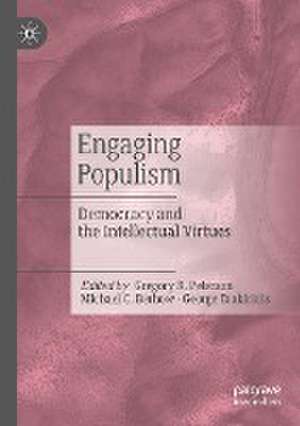Engaging Populism: Democracy and the Intellectual Virtues
Editat de Gregory R. Peterson, Michael C. Berhow, George Tsakiridisen Limba Engleză Paperback – 31 aug 2023
| Toate formatele și edițiile | Preț | Express |
|---|---|---|
| Paperback (1) | 642.03 lei 6-8 săpt. | |
| Springer International Publishing – 31 aug 2023 | 642.03 lei 6-8 săpt. | |
| Hardback (1) | 647.40 lei 6-8 săpt. | |
| Springer International Publishing – 30 aug 2022 | 647.40 lei 6-8 săpt. |
Preț: 642.03 lei
Preț vechi: 755.33 lei
-15% Nou
Puncte Express: 963
Preț estimativ în valută:
122.86€ • 128.86$ • 102.27£
122.86€ • 128.86$ • 102.27£
Carte tipărită la comandă
Livrare economică 01-15 aprilie
Preluare comenzi: 021 569.72.76
Specificații
ISBN-13: 9783031057878
ISBN-10: 3031057872
Pagini: 371
Ilustrații: XIV, 371 p.
Dimensiuni: 148 x 210 mm
Greutate: 0.46 kg
Ediția:1st ed. 2022
Editura: Springer International Publishing
Colecția Palgrave Macmillan
Locul publicării:Cham, Switzerland
ISBN-10: 3031057872
Pagini: 371
Ilustrații: XIV, 371 p.
Dimensiuni: 148 x 210 mm
Greutate: 0.46 kg
Ediția:1st ed. 2022
Editura: Springer International Publishing
Colecția Palgrave Macmillan
Locul publicării:Cham, Switzerland
Cuprins
Chapter 1: Introduction.- Part I: Putting Populism in Context.- Chapter 2: Using Political Psychology to Understand Populism, Intellectual Virtues, and Declining Support for Democratic Norms.- Chapter 3: Midcentury Populists & the Intellectual Virtues.- Chapter 4: Populism, Evangelicalism, and Technology: A Familiar Trinitarian Formula.- Part II: Populism and Intellectual Virtues: Philosophical Approaches.- Chapter 5: Populism, Expertise, and Intellectual Autonomy.- Chapter 6: Truthfulness as a Democratic Virtue.- Chapter 7: E Pluribus Unum? Empathy as an Antidote to Populism’s Antipluralism.- Chapter 8: Populism and the Virtues of Argument.- Chapter 9: Epistemic Charity in Times of Populist Polarization.- Part III: Populism and Intellectual Virtues Across Disciplines.- Chapter 10: An Epistemology for Listening across Cultural and Political Divides.- Chapter 11: Certain Simple Stories.- Chapter 12: Virtuous Autonomy and its Explanatory Role in Turkish Activism.- Chapter 13: The People, the Experts, and the Citizens: Cognitive and Recognitive Attitudes in Democratic Practice.- Part IV: The Big Picture: Virtues, Populism, and Epistemic Environments.- Chapter 14: Justifying Humanitarian Interference for Epistemic Threats.- Chapter 15: Intellectual Virtues, Epistemic Democracy, and the Wisdom of the Crowd.- Chapter 16: Pandemic Postscript: Populism and Intellectual Virtues After COVID-19.
Notă biografică
Gregory R. Peterson is Professor of Philosophy and Religion and Director of the Ethics Lab at South Dakota State University. While Dr. Peterson’s early work focused on issues of religion and science in the philosophy of religion, his more recent work focuses on moral and political philosophy and experimental ethics. Dr. Peterson is author or coauthor of over 50 journal articles and book chapters. In addition to the monograph, Minding God, he is co-editor of Property Rights in Contemporary Governance, Habits in Mind, and the Routledge Companion to Religion and Science. Dr. Peterson has also received numerous grant and fellowship awards from the National Endowment for the Humanities, the National Science Foundation, and the Templeton Foundation.
Michael C. Berhow is an Adjunct Lecturer of Philosophy at South Dakota State University. He is the author of Dysteleology: A Philosophical Assessment of Suboptimal Design in Biology (2019), and his research focuses on various topics related to religion and science, intellectual virtues, and political/social tribalism. In addition to his scholarly activity, Dr. Berhow has organized and participated in numerous lectures, forums, and panels—all of which are designed to address current events and controversies related to the intersection of science, ethics, religion, and politics.
Michael C. Berhow is an Adjunct Lecturer of Philosophy at South Dakota State University. He is the author of Dysteleology: A Philosophical Assessment of Suboptimal Design in Biology (2019), and his research focuses on various topics related to religion and science, intellectual virtues, and political/social tribalism. In addition to his scholarly activity, Dr. Berhow has organized and participated in numerous lectures, forums, and panels—all of which are designed to address current events and controversies related to the intersection of science, ethics, religion, and politics.
George Tsakiridis is Senior Lecturer of Philosophy & Religion at South Dakota State University, where he is involved with the Ethics Lab. He is the author of Evagrius Ponticus and Cognitive Science: A Look at Moral Evil and the Thoughts (2010), and Seven Virtues for Success (2021). His published research also focuses on the topic of guilt and forgiveness. Dr. Tsakiridis recently edited the volume Theology and Spider-Man (2021), and he is currently working on several projects related to popular culture. He holds a PhD in Religion and Science/Theology from the Lutheran School of Theology at Chicago.
Textul de pe ultima copertă
The past two decades have witnessed an intensifying rise of populist movements globally, and their impact has been felt in both more and less developed countries. Engaging Populism: Democracy and the Intellectual Virtues approaches populism from the perspective of work on the intellectual virtues, including contributions from philosophy, history, religious studies, political psychology, and law. Although recent decades have seen a significant advance in philosophical reflection on intellectual virtues and vices, less effort has been made to date to apply this work to the political realm. While every political movement suffers from various biases, contemporary populism’s association with anti-science attitudes and conspiracy theories makes it a potentially rich subject of reflection concerning the role of intellectual virtues in public life. Interdisciplinary in approach, Engaging Populism will be of interest to scholars and students in philosophy, political theory, psychology, and related fields in the humanities and social sciences.
Caracteristici
Explores what populism reveals about the role of intellectual virtues and vices in political cognition Offers scholarly accounts of how epistemic virtues and vices contribute to our understanding of populism Provides insight from the fields of history, religious studies, political psychology, and law
